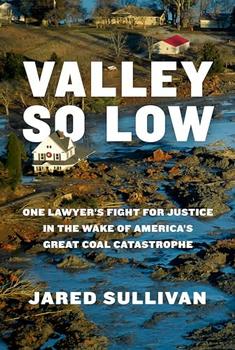
One Lawyer's Fight for Justice in the Wake of America's Great Coal Catastrophe
by Jared Sullivan
A riveting courtroom drama about the victims of one of the largest environmental disasters in U.S. history—and the country lawyer determined to challenge the notion that, in America, justice can be bought.
For more than 50 years, a power plant in the small town of Kingston, Tennessee, burned fourteen thousand tons of coal a day, gradually creating a mountain of ashen waste 60 feet high and covering 84 acres, contained only by an earthen embankment. In 2008, just before Christmas, that embankment broke, unleashing a lethal wave of coal sludge that covered 300 acres, damaged nearly 30 homes, and precipitating a cleanup effort that would cost more than $1 billion—and the lives of more than 50 cleanup workers who inhaled the toxins it released.
Jim Scott, a local personal-injury lawyer, agreed to represent the workers after they began to fall ill. That meant doing legal battle against the Tennessee Valley Authority, a colossal, federally owned power company that had once been a famous cornerstone of President Franklin D. Roosevelt's New Deal. Scott and his hastily assembled team gathered extensive evidence of malfeasance: threats against workers; retaliatory firings; disregarded safety precautions; and test results, either hidden or altered, that would have revealed harmful concentrations of arsenic, lead, and radioactive materials at the cleanup site. At every stage, Scott—outmanned and nearly broke—had to overcome legal hurdles constructed by TVA and the firm it hired to help execute the cleanup. He grew especially close to one of the victims, whose swift decline only intensified his hunger for justice. As the incriminating evidence mounted, the workers seemed to have everything on their side, including the truth—and yet, was it all enough to prevail?
The lawsuit that Scott pursued on the workers' behalf was about their illnesses, no doubt. But it was also about whether blue-collar employees could beat the C-suite; if self-described "hillbilly lawyers" could beat elite corporate defense attorneys; and whether strong evidence could beat fat pocketbooks. With suspense and rich detail, Jared Sullivan's thrilling account lays bare the casual brutality of the American justice system, and calls into question whether—and how—the federal government has failed its people.
"[Sullivan] amasses a huge amount of information, and while this helps him build a strong case, it also bogs down the narrative in places. Another problem is that the book's three long parts each cover a lengthy period, making it at times a difficult read. Nevertheless, the overall impact of the story remains strong, thanks to Sullivan's careful research and empathy for the disaster's victims. Of particular interest to readers interested in environmental issues and public liability law." —Kirkus Reviews
"Valley So Low is more than a tale of unrepentant corporate evil and incomprehensible environmental destruction. It's more, even, than a spellbinding courtroom drama. This brilliant, necessary book is a testament to the power of perseverance and a blueprint for challenging industry's shrugged-off human costs. Valley So Low is a ballad, yes, but it's also an anthem. And a triumph." —Margaret Renkl, author of The Comfort of Crows
"Jared Sullivan's Valley So Low is a gripping legal thriller documenting the power and greed behind this appalling and deadly environmental disaster. Not since Jonathan Harr's A Civil Action has a book so compellingly documented one man's Herculean efforts to force accountability through the courts." —Gilbert King, Pulitzer Prize-winning author of Devil in the Grove
"Jared Sullivan brings to mind a young William Langewiesche in his skill at following human stories through the dense fact-field of long, careful reporting on major events." —John Jeremiah Sullivan, author of Pulphead
This information about Valley So Low was first featured
in "The BookBrowse Review" - BookBrowse's membership magazine, and in our weekly "Publishing This Week" newsletter. Publication information is for the USA, and (unless stated otherwise) represents the first print edition. The reviews are necessarily limited to those that were available to us ahead of publication. If you are the publisher or author and feel that they do not properly reflect the range of media opinion now available, send us a message with the mainstream reviews that you would like to see added.
Any "Author Information" displayed below reflects the author's biography at the time this particular book was published.
Jared Sullivan has written for The New Yorker, Time, Garden & Gun, and USA Today, and he previously worked as a writer and editor at Men's Journal and Field & Stream. He lives in Franklin, TN.




A library is a temple unabridged with priceless treasure...
Click Here to find out who said this, as well as discovering other famous literary quotes!
Your guide toexceptional books
BookBrowse seeks out and recommends the best in contemporary fiction and nonfiction—books that not only engage and entertain but also deepen our understanding of ourselves and the world around us.